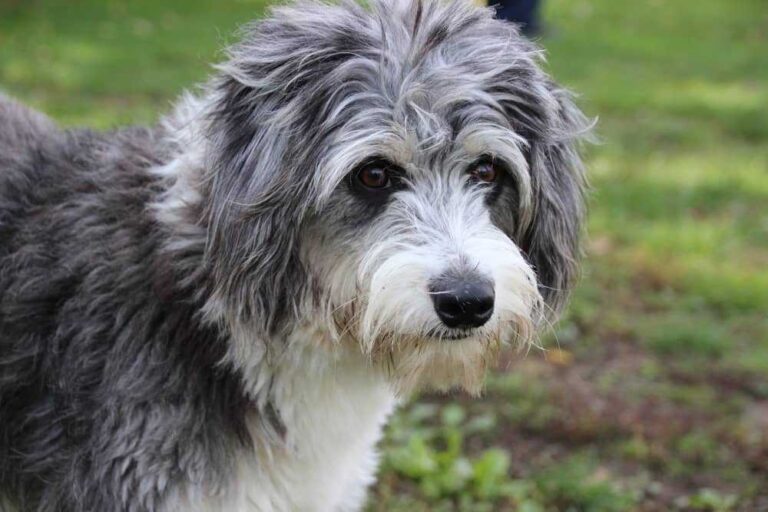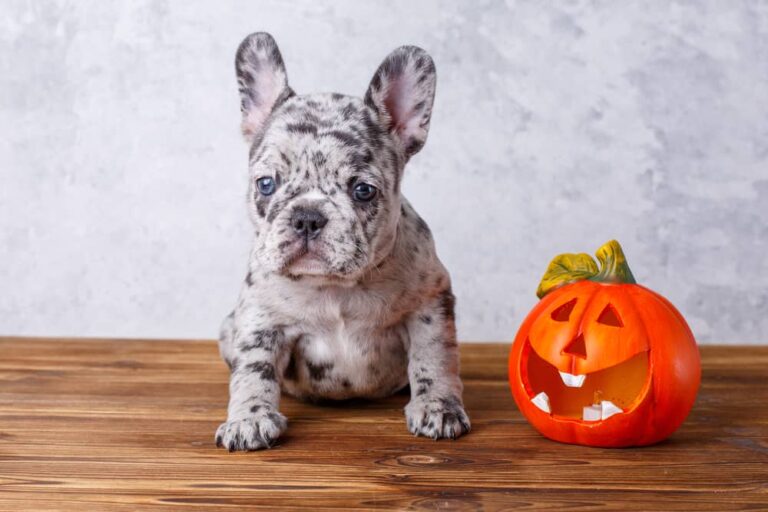Dynamic Merle Pit Bull: Embracing Their One-of-a-Kind Coats
Merle pit bull is a dog with specific coat color and markings. The merle pattern creates a mottled look with patches or spots of a lighter color on a darker background. They have different colors, including blue, gray, black, or brown.
However, it should be noted that the American Kennel Club, a reputable organization, does not accept the Merle model for pit bulls. The merle pattern is more common in other breeds, such as Australian Shepherds and Great Danes.
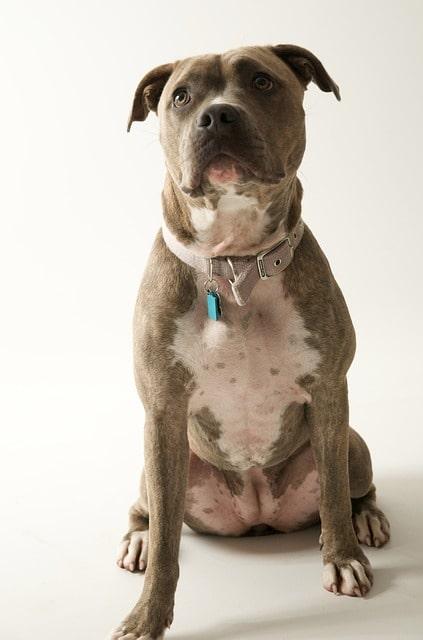
Breeding like a merle in pitbulls can lead to health problems. If both parents are carriers of the Merle gene, it can increase the risk of developing problems like deafness, blindness, and other genetic disorders. Responsible breeders avoid breeding healthy dogs.
It is important to consider the dog’s health, behavior, and responsible attitude and not just the color of the coat when you are looking to buy a Merle pit bull. Buying a dog from reputable sources like reputable breeders or rescue organizations is encouraged to ensure your dog is well cared for and loved.
Also Read: Amazing Facts for German Shepherd Corgi Mix | All Things Dogs
Merle Pitbull Puppies
Merle pitbull puppies are adorable and unique. They have a distinctive coat pattern with different colored spots on it. These puppies are a Pit Bull Terrier mix known for their strength and loyalty.
Merle pitbull puppies have a muscular body, short coat, and stocky build. They have a large skull and a strong jaw. Their eyes can be of any color, such as blue or amber, which adds to her appeal.
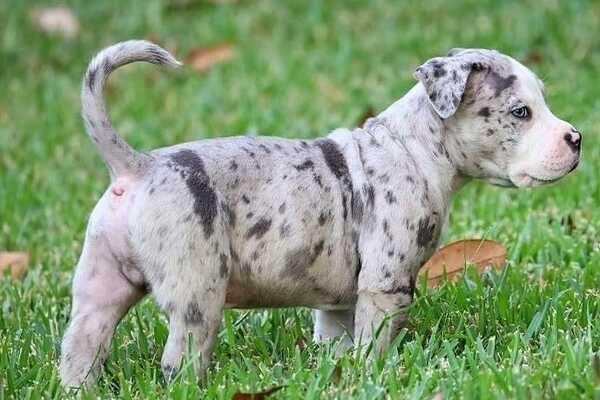
Merle pit puppies are well-known for being sociable and lively. They like to communicate with their owners and feel like they are a part of the family. Just like other pups, Merle pitbull puppies require adequate care and training.
Giving children regular physical activity, nutritious food, and social interaction is critical. Training them from an early age ensures that they become well-mannered and obedient canines.
Merle pit puppies have become popular pets in many houses because of their distinct hair pattern and friendly attitude. However, it is vital to remember that appropriate ownership and care are critical to their well-being.
How Much are Merle Pitbulls Worth?
In some cases, merle pitbulls have sold for exceptionally high prices, exceeding $30,000. These awards are due to several factors, such as the rarity of the merle coat pattern in pit bulls and the demand for these unique dogs.
However, it should be noted that these high prices are not representative of the entire market and are mostly tied to specific breeders or lines. An investment in Merle Pit Bull at a higher price must come with additional guarantees regarding the health of the Merle pit puppies and their parents.
Reputable breeders often offer health guarantees and transparency regarding possible genetic health issues related to the Merle gene. They also provide constant support and guidance in raising your new partner.
However, remember that most Merle pitbulls are available at lower prices, ranging from a few hundred to several thousand dollars. These prices are still influenced by factors such as the breeder’s pedigree, lineage, and reputation but are generally more accessible to a wider range of potential owners.
How Rare are Merle Pitbulls?
Merle pit bulls are considered relatively rare compared to other coat colors of the pit bull breed. The merle coat pattern is caused by a genetic mutation characterized by diluted patches of color and a mottled appearance.
In Pitbulls, the Merle coat pattern is not a natural color variant. Merle pit bulls are believed to have been created by crossing other breeds that carry the merle gene, such as the American Staffordshire Terrier or the Catahoula Leopard Dog.
The rarity of the Merle pit bull can vary by region and husbandry practices in that area. In some areas, merle pit bulls can be relatively common, while in others, they can be more difficult to find. Demand for merle pitbulls has increased in recent years due to their unique and eye-catching looks.
Nutrition Requirements for Merle Pit Bull
Food and Dietary Requirements
- Banana: Dogs can enjoy the natural sweetness and health benefits of bananas in moderation.
- Asparagus: A nutritious veggie that can be a crunchy and tasty treat for your furry friend.
- Strawberry: Rich in vitamins, strawberries make a delightful occasional snack for dogs.
- Orange Chicken: Plain cooked chicken without spices or sauces can be a safe protein source for dogs.
- Almond Butter: Avoid almonds, but dogs can indulge in unsalted and unsweetened almond butter as an occasional treat.
- Quesadilla: Plain tortilla with a small amount of cheese can be a simple treat for dogs.
- Pita Bread: A small piece of plain pita bread can be given as an occasional snack.
- Ricotta Cheese: Dogs may enjoy a little ricotta cheese as an occasional treat, but avoid excessive amounts.
- Provolone Cheese: Offer a tiny piece of provolone cheese as a special reward for your furry companion.
- Banana Pudding: Plain banana pudding without additives or artificial sweeteners can be an occasional treat.
- Watermelon: A refreshing and hydrating fruit that dogs can enjoy in small, seedless portions.
- Coffee Chew Wood: Coffee and any type of wood should be kept away from dogs, as they are harmful.
- Oatmeal Cream Pie: Avoid sugary snacks like oatmeal cream pies, as they are not suitable for dogs.
- Teriyaki Sauce: Skip the teriyaki sauce, as the high sodium content is unhealthy for dogs.
- Mushroom Cream Soup: Keep creamy soups, especially those with mushrooms, away from your furry friend.
Also Read: Adorable English Cream Dachshund – Ultimate Guide
Nutritional Benefits of Vitamins and Minerals
Vitamins and Nutritional Pros and Cons
- Banana:
- Vitamin B6:
- Pros: Supports metabolism, immune system, and red blood cell production.
- Cons: Overconsumption may cause gastrointestinal upset due to high fiber content.
- Vitamin C:
- Pros: Acts as an antioxidant, boosts the immune system, and promotes healthy skin.
- Cons: Dogs produce their own vitamin C, so supplementation is usually unnecessary.
- Vitamin B6:
- Asparagus:
- Vitamin A:
- Pros: Essential for vision, immune function, and cell growth.
- Cons: High-fiber content may lead to stomach upset if given in large quantities.
- Vitamin C:
- Pros: Supports the immune system and helps absorb iron.
- Cons: Overfeeding may lead to gas or mild digestive issues.
- Vitamin A:
- Strawberry:
- Vitamin C:
- Pros: Provides a boost to the immune system and has antioxidant properties.
- Cons: Should be given in moderation due to natural sugars.
- Vitamin C:
- Orange Chicken:
- Vitamin B6:
- Pros: Supports metabolism and brain health.
- Cons: Avoid giving chicken with spices or sauces, which can be harmful.
- Vitamin B6:
- Almond Butter:
- Vitamin E:
- Pros: Protects cells from damage and promotes healthy skin and coat.
- Cons: Almonds themselves can be a choking hazard, so avoid direct consumption.
- Vitamin E:
- Quesadilla:
- Vitamin B6:
- Pros: Supports energy metabolism and nervous system function.
- Cons: High-fat content in cheese may lead to weight gain if given excessively.
- Vitamin B6:
- Pita Bread:
- Various B Vitamins:
- Pros: Essential for energy metabolism and nerve function.
- Cons: Pita bread can be high in carbohydrates, so feed in moderation.
- Various B Vitamins:
- Ricotta Cheese:
- Vitamin A:
- Pros: Important for vision and immune system support.
- Cons: High-fat content, so feed in small amounts to avoid weight gain.
- Vitamin B12:
- Pros: Supports nerve function and red blood cell production.
- Cons: Excessive consumption may lead to gastrointestinal upset.
- Vitamin D:
- Pros: Aids calcium absorption and supports bone health.
- Cons: Over-supplementation can lead to toxicity, as dogs can’t regulate vitamin D as effectively as humans.
- Vitamin K:
- Pros: Crucial for blood clotting and bone health.
- Cons: Excessive vitamin K can interfere with blood-thinning medications.
- Calcium:
- Pros: Essential for bone and teeth health, muscle function, and nerve transmission.
- Cons: Over-supplementation can lead to skeletal problems and urinary issues.
- Vitamin A:
- Provolone Cheese:
- Vitamin A, Vitamin B12, Vitamin K, Calcium:
- Pros: Similar to ricotta cheese, these vitamins and minerals offer various health benefits.
- Cons: High-fat and sodium content, so feed in moderation to avoid health issues.
- Vitamin A, Vitamin B12, Vitamin K, Calcium:
- Banana Pudding:
- Vitamin B6:
- Pros: Supports metabolism and various body functions.
- Cons: Pudding may contain added sugars and artificial ingredients, which are not suitable for dogs.
- Vitamin B6:
- Watermelon:
- Vitamin A, Vitamin B6, Vitamin C:
- Pros: Provide essential vitamins and hydration.
- Cons: Remove seeds and feed seedless watermelon in small portions to prevent choking.
- Vitamin A, Vitamin B6, Vitamin C:
Are Merely Pitbulls Aggressive?
Pitbulls are not naturally aggressive toward humans but can be protective, which may cause them to react to perceived threats. Merely pitbulls have been trained to be aggressive in the past, but it is important to know that pit bulls are not naturally aggressive toward humans.
Instead of aggressiveness, they are known for their loyalty and human love. They are also intelligent and always want to please, which makes them easy to train. Merely pitbulls are misunderstood because of their bad reputation for being more aggressive.
They have been used for dogfights and other violent activities in the past, which can promote aggression in them toward other animals.
However, proper training and socialization may prevent them from becoming aggressive. It is also important to note that pitbulls have a calmer temperament than most dogs. They are considered family-friendly and known for their great love for humans.
Also Read: Big Rope French Bulldog – Ultimate Guide
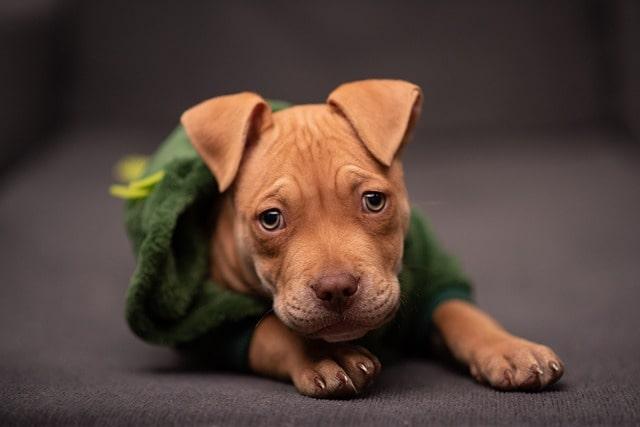
Types of Merle PitBull
There are following types of pitbulls.
- Red merle pit bull
- Tri Colored merle pit bull
- Leopard merle pit bull
- Blue merle Pitbull
- White merle Pit bull
Red Merle pit bull
Red Merle pit bulls are called Pitbulls with a Merle coat pattern and a predominantly red or reddish-brown base color. The red merle coat pattern typically consists of patches or marbling of diluted pigment on a red or reddish-brown base.
Some red merle pitbull have a red nose, known as red nose merle pitbull. The nose color in red nose merle Pitbull can vary in shade, ranging from a light reddish hue to a deeper, darker red coloration.
The merle pattern creates a mosaic-like effect with darker and lighter shades of red, resulting in a visually striking appearance. Prospective owners of red merle Pitbulls should seek reputable breeders who prioritize health, conduct genetic testing, and follow responsible breeding practices.
Additionally, providing proper care, regular veterinary check-ups, socialization, and training are essential for the overall well-being of red merle Pitbulls.
Tri Colored merle pit bull
A unique combination of the merle pattern and tan and white markings characterizes tri colored merle Pitbulls. In tri-colored merle Pitbulls, the merle pattern appears in smaller patches rather than covering the entire coat.
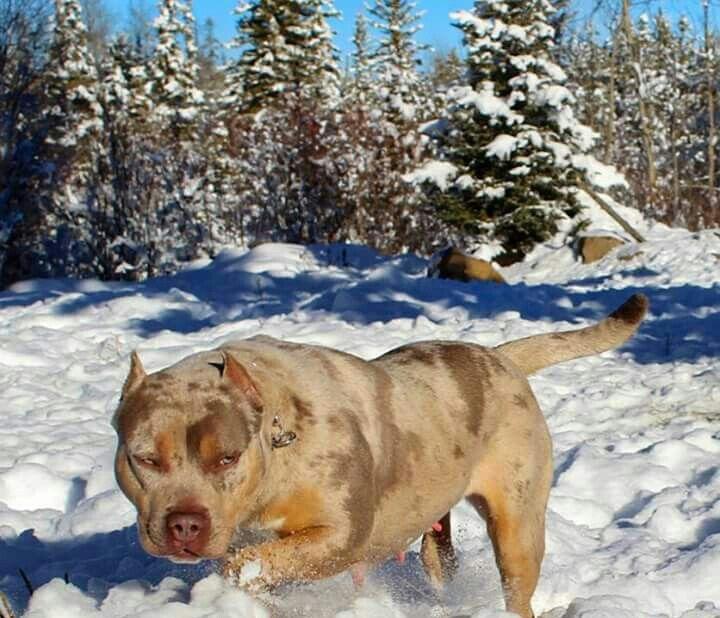
The remaining portions of the coat exhibit a combination of tan and white colors, adding to the distinctive appearance of these dogs.
The tan coloration in tri-colored merle Pitbulls typically appears in the eyebrows, cheeks, chest, legs, and sometimes on the muzzle. This warm tan hue creates a striking contrast against the merle patches, further enhancing the visual appeal of these dogs.
The white markings often appear on the chest and paws and may extend to the face or neck, adding additional variation to their overall charm.
Leopard Merle Pitbull
Leopard merle Pitbulls are not purebred Pit Bulls but rather a mix between a Pitbull and a Catahoula Leopard Dog. The Catahoula Leopard Dog is a distinct breed known for its merle coat patterns, which come in various shades and combinations.
When these two breeds are crossed, it is possible to produce puppies with the characteristic spots inherited from the Catahoula Leopard Dog.
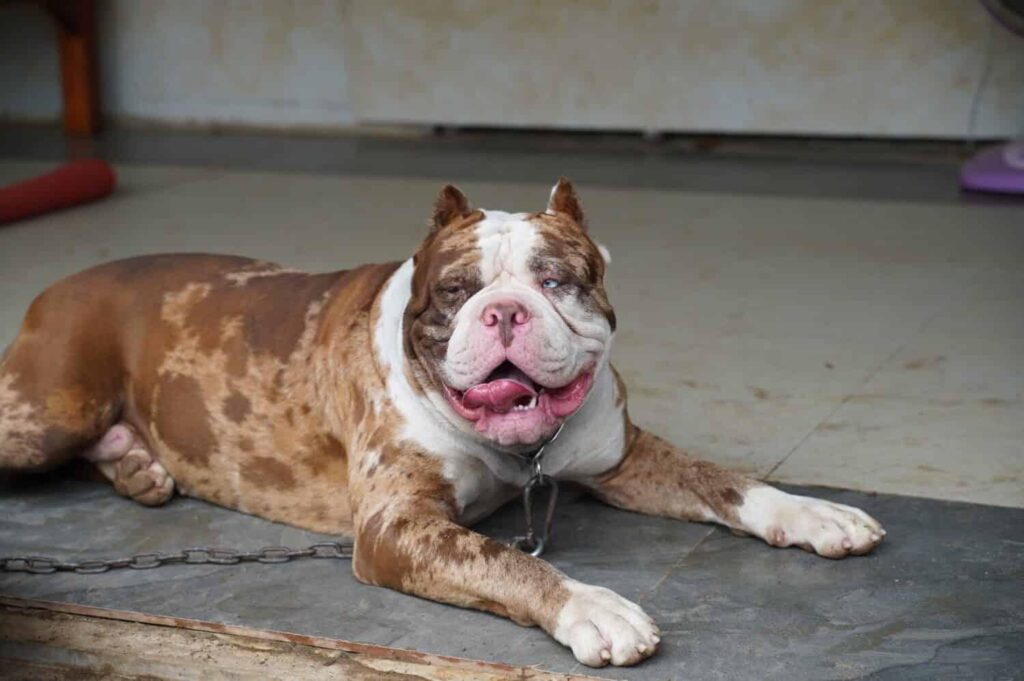
The leopard merle Pitbulls typically exhibit a yellow-tan base coat, which serves as the background color. Over this base, they develop brown spots, often varying in size and intensity.
These spots can be scattered across the body, creating a visually striking and unique appearance. Additionally, some leopard merle Pitbulls may have white markings on their chest, further adding to their distinctiveness.
The influence of the Catahoula Leopard Dog in these mixes brings forth the merle pattern and its associated coat variations. The resulting puppies may display a range of coat colors, including variations of merle, such as blue merle Pitbull, red merle Pitbull, or chocolate merle Pitbull, depending on the genetic inheritance from both parent breeds.
It is important to note that leopard merle Pitbulls are not a standardized breed or recognized variation within established kennel clubs. As mixed breeds, their appearance and traits can vary, influenced by the individual characteristics and genetics of the parent breeds.
Also Read: Fearless Black Pitbull: A Loyal and Loving Companion
Blue Merle Pitbull
Blue merle Pitbulls are a variation within the Pitbull breed that exhibits the merle gene, resulting in a unique and striking coat pattern. These dogs have a blue base color on their nose, paw pads, and coats, which gives them a distinct appearance. The merle pattern covers their entire skin, creating a mesmerizing display of random dark and light blue combinations.

The blue merle coat pattern is characterized by patches on the base color, creating a visually appealing mosaic effect. The dark blue areas often stand out against the lighter blue-gray base, adding depth and contrast to their overall appearance. These dogs may also have black spots throughout their coat, enhancing the striking visual impact.
When considering a blue merle Pitbull, it is crucial to research and understand the potential health concerns associated with the merle gene. When present in double doses, the Merle gene can be linked to various health issues like deafness, eye abnormalities, and increased susceptibility to sunburn.
White Merle Pit bull
White merle Pitbulls are a variation within the merle coated Pitbulls with a distinctive white base coat with a merle pattern overlaid on top. The white base creates a striking canvas for the merle pattern, resulting in a visually pleasing appearance.
The merle pattern in white merle Pitbulls consists of patches that create darker and lighter white hues, resembling cream or tan-colored spots and blotches distributed throughout their coat.
The white base color allows the merle pattern to stand out prominently, making the spots and blotches more apparent and visually appealing. Combining the merle pit bull pattern with the white base results in a unique and eye-catching appearance that distinguishes these Pitbulls from other coat variations.

FAQ,s
Is Merle a pit bull registered color?
No, Merle is not a recognized color within the official breed standards for the American Pit Bull Terrier.
For breeders who refer to certain Pit Bulls with merle-like coat patterns as merle pit bull, it is crucial to understand that these dogs are not recognized or registered as a separate color variation within the official breed standards.
Breed standards typically specify specific acceptable coat colors for each breed, and merle pit bull is not one of them for the American Pit Bull Terrier.
Also Read: Amazing Long Haired Pitbull – Ultimate Guide
Are merle pitbulls healthy?
Like all Merle dogs, Merle pit bulls can be healthy if responsible husbandry practices are followed. However, when two merle dogs are bred, there is a chance of producing puppies with a double dose of the merle gene, referred to as homozygous merle.
These dogs are at greater risk of many health problems, including hearing and vision disorders than other canines.
Conclusion
Merle Pitbulls come in various coat patterns and colors, such as red, blue, tricolor, leopard, and white merle. However, it should be noted that merle is not a color recognized by official breed standards.
Responsible husbandry practices can impact the health of Merle pit bulls. Breeders should avoid mating two Merle dogs to minimize the risk of health problems related to the Merle gene.
When raised responsibly, merle pit bull can lead healthy lives, but caution should be exercised due to possible genetic health issues related to the merle gene. Proper grooming, socialization, and training are essential to the overall well-being of any dog, including the Merle Pitbull.
When examining a Pit Bull, Merle, it’s important to focus on the dog’s overall health and responsible owner, not just coat color.
Reference
To learn more about the health of Merle Dog breeds, then please visit


